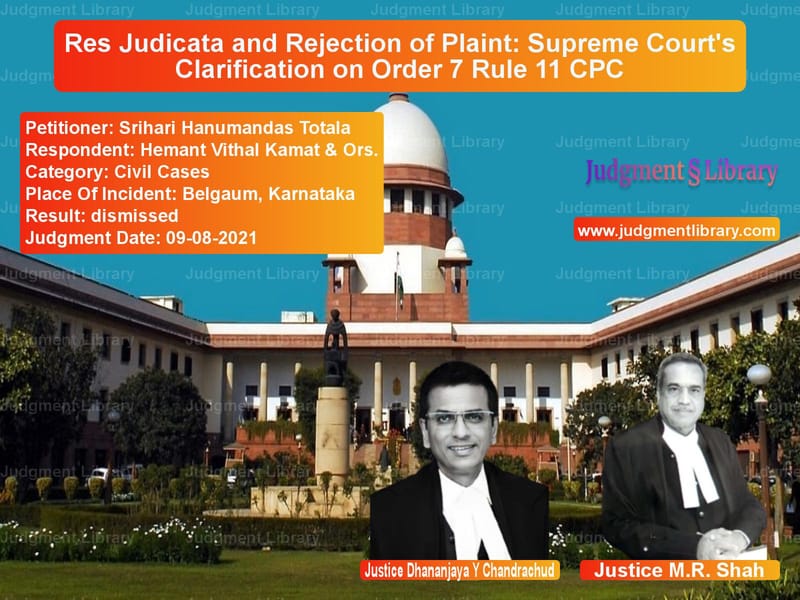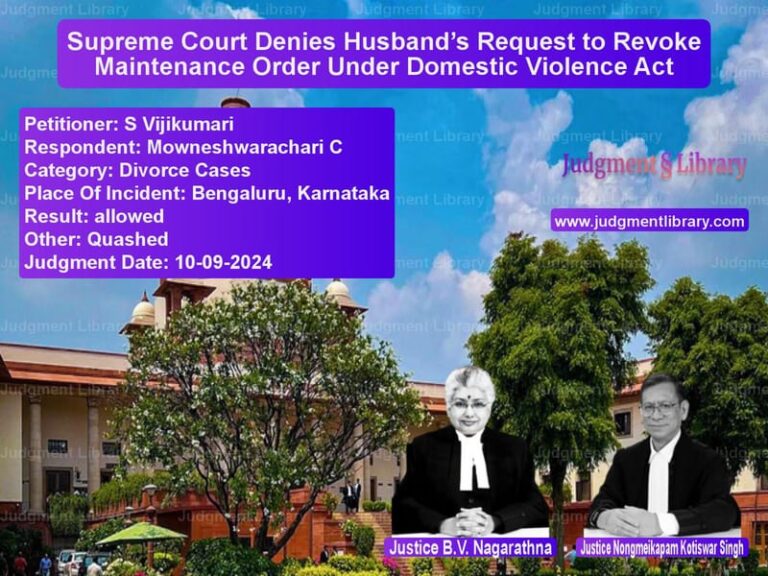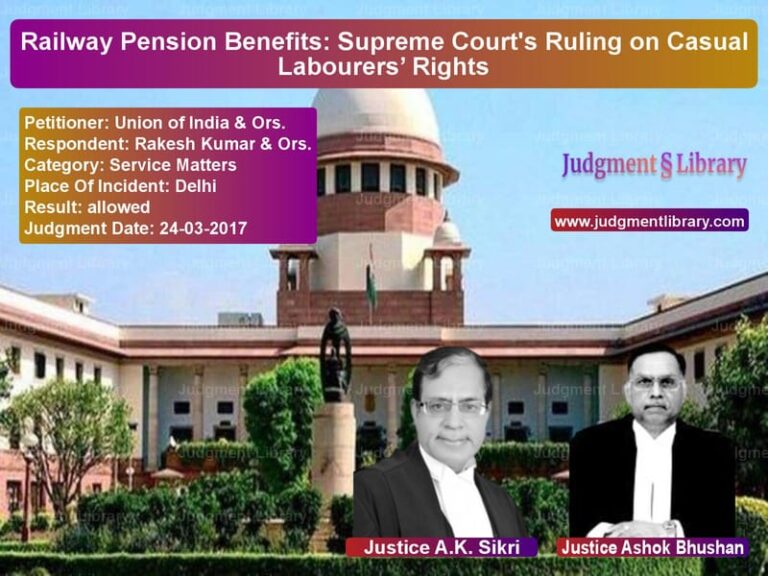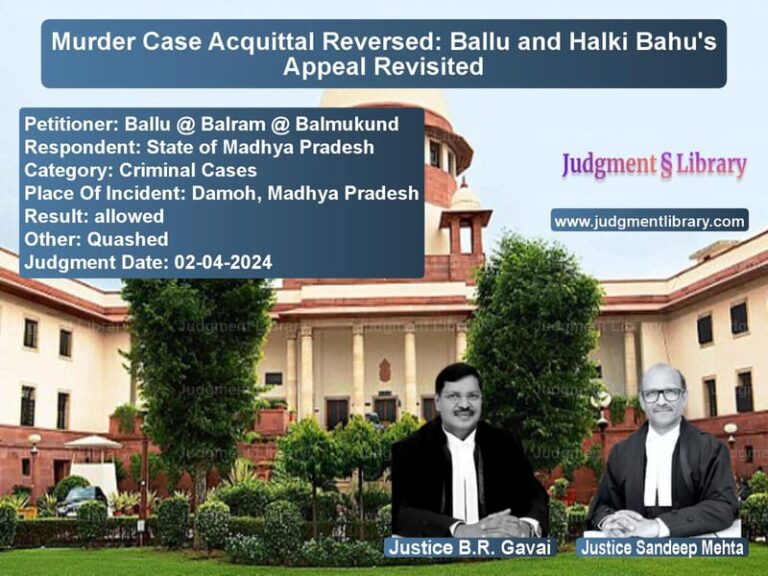Res Judicata and Rejection of Plaint: Supreme Court’s Clarification on Order 7 Rule 11 CPC
The case of Srihari Hanumandas Totala vs. Hemant Vithal Kamat & Ors. is a significant ruling by the Supreme Court of India concerning the application of Order 7 Rule 11(d) of the Code of Civil Procedure, 1908 (CPC). This case primarily deals with the rejection of a plaint on the ground that the suit is barred by law, particularly under the principle of res judicata.
The appeal arose from a judgment of the Karnataka High Court, which upheld the rejection of an application under Order 7 Rule 11 seeking dismissal of a civil suit on the ground that it was barred by res judicata. The Supreme Court’s decision provides clarity on when a plaint can be rejected under Order 7 Rule 11 and the limits of judicial scrutiny at that stage.
Background of the Case
The dispute revolved around the ownership and auction of a property. The key events in the case were:
- The suit property originally belonged to Ms. Leela Vithal Kamat.
- After her death in 1996, the property was inherited by her legal heirs, including the first respondent, Hemant Vithal Kamat, and his brother.
- The legal heirs mortgaged the property with the Karnataka State Finance Corporation (KSFC) as security for a loan.
- Due to non-payment of the loan, KSFC auctioned the property in 2006, with the third respondent furnishing the highest bid and acquiring the property.
- However, the legal heirs refused to vacate the property, leading to litigation.
In 2007, the auction purchaser filed a suit for possession (OS No. 103/2007). During this suit, the first respondent contended that KSFC had no authority to auction the property, a claim that was rejected by the trial court, which ruled in favor of the auction purchaser.
While the possession suit was pending, the first respondent filed a new suit in 2008 (OS No. 138/2008) seeking partition of the same property, claiming his rightful share and challenging the validity of the auction sale.
Petitioner’s Arguments
The appellant, Srihari Hanumandas Totala, argued that:
- The issues raised in the 2008 suit had already been adjudicated in the 2007 possession suit.
- The principle of res judicata applied since the first respondent had contested the auction’s validity in the previous suit.
- The trial court and high court erred in not rejecting the plaint under Order 7 Rule 11(d), which mandates rejection when a suit is barred by law.
Respondent’s Arguments
The respondent, Hemant Vithal Kamat, countered that:
- The 2007 suit was for possession, whereas the 2008 suit sought partition, making them distinct causes of action.
- Res judicata requires detailed examination of pleadings, which cannot be done at the Order 7 Rule 11 stage.
- The application for rejection of the plaint was premature and should be decided only after evidence was led.
Key Legal Considerations
The Supreme Court examined two critical legal principles:
1. Scope of Order 7 Rule 11 CPC
Order 7 Rule 11 allows rejection of a plaint in the following cases:
- When it does not disclose a cause of action.
- When the suit is barred by law (such as limitation or res judicata).
- When the relief claimed is undervalued or insufficiently stamped.
The Court emphasized that only the averments in the plaint must be examined to decide a rejection under Order 7 Rule 11. External evidence, such as previous suit judgments, cannot be considered at this stage.
2. Res Judicata and Its Application
Section 11 of the CPC lays down the principle of res judicata, which bars re-litigation of issues already decided in a previous suit between the same parties.
The Supreme Court ruled that while the appellant could raise res judicata as a defense, its determination required examination of prior pleadings, judgments, and evidence, which is beyond the scope of an Order 7 Rule 11 application.
Court’s Observations
The Supreme Court made several key observations:
“For an application under Order 7 Rule 11(d), only the statements in the plaint are relevant. Any defense raised by the defendants cannot be considered at this stage.”
The Court reiterated that:
- Res judicata requires scrutiny of prior records, making it unsuitable for decision under Order 7 Rule 11.
- The trial court must frame a preliminary issue on res judicata and decide it before proceeding with the case.
- Allowing rejection of the plaint prematurely would deny the respondent a fair chance to prove his claim.
Final Verdict
The Supreme Court dismissed the appeal and upheld the High Court’s ruling that the plaint could not be rejected at the threshold. However, it directed the trial court to frame a preliminary issue on res judicata and decide it within three months.
“We affirm the findings of the Trial Court and the High Court that the application under Order 7 Rule 11(d) should be dismissed. However, the appellant is at liberty to raise the issue of res judicata before the trial court.”
Implications of the Judgment
This ruling has far-reaching consequences for civil litigation in India:
- Strict Interpretation of Order 7 Rule 11: Courts must assess only the plaint’s averments, preventing premature dismissal of suits.
- Protection Against Misuse of Res Judicata: The decision ensures that litigants cannot use res judicata as a tool for summary dismissal.
- Judicial Efficiency: The ruling directs trial courts to handle res judicata as a preliminary issue, reducing unnecessary delays.
By reinforcing procedural fairness, this judgment upholds the rights of litigants while preventing frivolous re-litigation.
Petitioner Name: Srihari Hanumandas Totala.Respondent Name: Hemant Vithal Kamat & Ors..Judgment By: Justice Dhananjaya Y Chandrachud, Justice M.R. Shah.Place Of Incident: Belgaum, Karnataka.Judgment Date: 09-08-2021.
Don’t miss out on the full details! Download the complete judgment in PDF format below and gain valuable insights instantly!
Download Judgment: srihari-hanumandas-t-vs-hemant-vithal-kamat-supreme-court-of-india-judgment-dated-09-08-2021.pdf
Directly Download Judgment: Directly download this Judgment
See all petitions in Property Disputes
See all petitions in Contract Disputes
See all petitions in Specific Performance
See all petitions in Damages and Compensation
See all petitions in Consumer Rights
See all petitions in Judgment by Dhananjaya Y Chandrachud
See all petitions in Judgment by Mukeshkumar Rasikbhai Shah
See all petitions in dismissed
See all petitions in supreme court of India judgments August 2021
See all petitions in 2021 judgments
See all posts in Civil Cases Category
See all allowed petitions in Civil Cases Category
See all Dismissed petitions in Civil Cases Category
See all partially allowed petitions in Civil Cases Category







